The AMD Ryzen 3 1300X and Ryzen 3 1200 CPU Review: Zen on a Budget
by Ian Cutress on July 27, 2017 9:30 AM EST- Posted in
- CPUs
- AMD
- Zen
- Ryzen
- Ryzen 3
- Ryzen 3 1300X
- Ryzen 3 1200
Benchmarking Performance: CPU Legacy Tests
Our legacy tests represent benchmarks that were once at the height of their time. Some of these are industry standard synthetics, and we have data going back over 10 years. All of the data here has been rerun on Windows 10, and we plan to go back several generations of components to see how performance has evolved.
All of our benchmark results can also be found in our benchmark engine, Bench.
3D Particle Movement v1
3DPM is a self-penned benchmark, taking basic 3D movement algorithms used in Brownian Motion simulations and testing them for speed. High floating point performance, MHz and IPC wins in the single thread version, whereas the multithread version has to handle the threads and loves more cores. This is the original version, written in the style of a typical non-computer science student coding up an algorithm for their theoretical problem, and comes without any non-obvious optimizations not already performed by the compiler, such as false sharing.
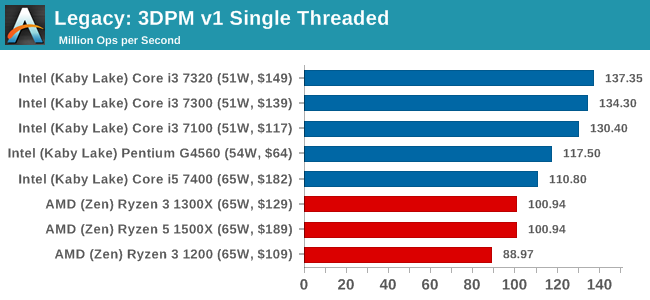
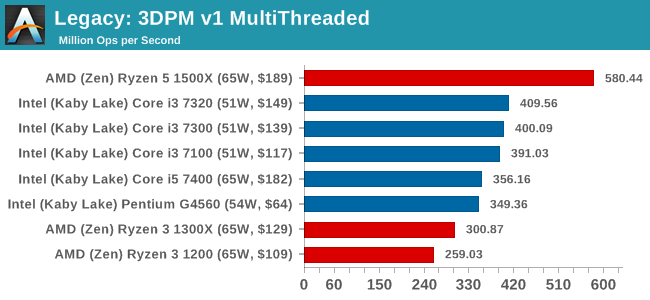
CineBench 11.5 and 10
Cinebench is a widely known benchmarking tool for measuring performance relative to MAXON's animation software Cinema 4D. Cinebench has been optimized over a decade and focuses on purely CPU horsepower, meaning if there is a discrepancy in pure throughput characteristics, Cinebench is likely to show that discrepancy. Arguably other software doesn't make use of all the tools available, so the real world relevance might purely be academic, but given our large database of data for Cinebench it seems difficult to ignore a small five-minute test. We run the modern version 15 in this test, as well as the older 11.5 and 10 due to our back data.
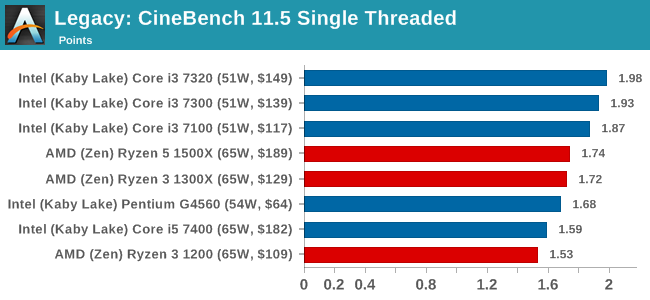
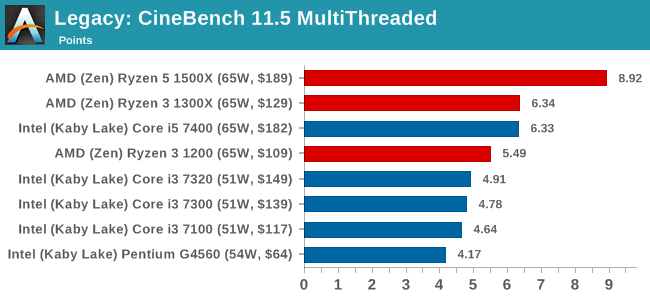
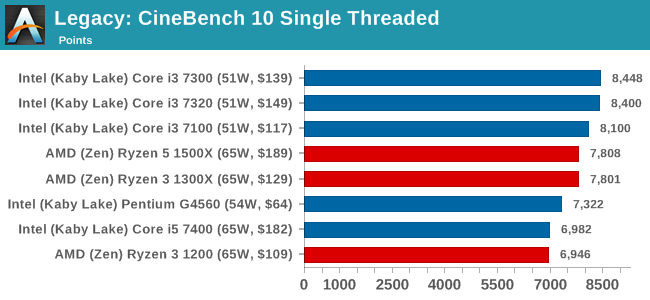
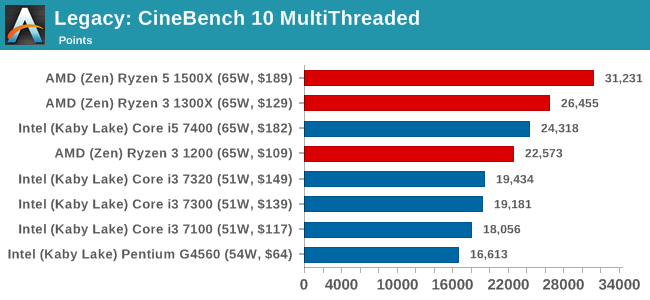
x264 HD 3.0
Similarly, the x264 HD 3.0 package we use here is also kept for historic regressional data. The latest version is 5.0.1, and encodes a 1080p video clip into a high-quality x264 file. Version 3.0 only performs the same test on a 720p file, and in most circumstances the software performance hits its limit on high-end processors, but still works well for mainstream and low-end. Also, this version only takes a few minutes, whereas the latest can take over 90 minutes to run.
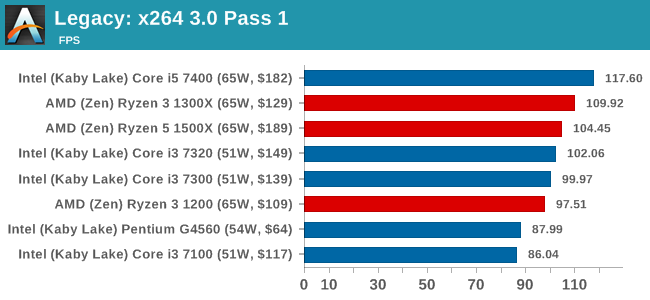
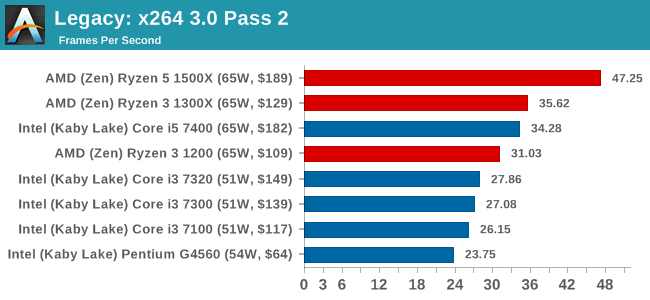










140 Comments
View All Comments
uibo - Thursday, July 27, 2017 - link
I thought you guys hated misleading scales on graphs.Looking at the performance per dollar graphs, I think the lowest point vertically should be -100%
lefenzy - Thursday, July 27, 2017 - link
That's silly. 0% is the zero on that graph, not some arbitrary -100%akrobet - Thursday, July 27, 2017 - link
Keep in mind that Intel is pulling the G4560 from the market, because it's "too good" for its price.MajGenRelativity - Thursday, July 27, 2017 - link
Source?MrCommunistGen - Thursday, July 27, 2017 - link
Not counting it as a "source" but I saw this pop up at wccftech. I didn't spend any time looking, but I haven't stumbled upon any corroboration on other sites in my tech reading.MajGenRelativity - Thursday, July 27, 2017 - link
I just found the article on wccftech. It actually said that Intel is NOT killing off the G4560T1beriu - Thursday, July 27, 2017 - link
wccftech....
....
BWHAHAHAHAHAHAH
GreenMeters - Thursday, July 27, 2017 - link
SHED does not exist. Ryzen 7 maps to the standard i7 market that has never been called HEDT. Threadripper is HEDT. The fact that it puts Intel's HEDT to shame doesn't mean it's a new segment. It means Intel better get with the program.Ian Cutress - Thursday, July 27, 2017 - link
Ryzen 7 was mapped against Intel's Broadwell-E HEDT platform at launch for core count, performance, and aggressive pricing. Threadripper is a stage above that, and isn't even called HEDT internally at AMD. Then we have the HCC core count silicon coming from Intel. SHED exists.DrKlahn - Thursday, July 27, 2017 - link
Ok I'm seriously beginning to wonder about the objectivity here. So your conclude this:"First is that the Ryzen 3 1200 does not look like an attractive option. It performs +2-3% of the Pentium but is $30 more expensive, and the Core i3-7100 beats it by 8% for only a sub-$10 cost."
But aren't mentioning that the Pentiums are locked parts and the 1200 isn't? Your competing sites do have overclocking data and the Pentiums are hopelessly outclassed. Granted not everyone overclocks, but on an enthusiast site that at least warrants a mention. Not everyone will read your followup(s) and that conclusion does not tell the full story. I know if I was building a machine a 1200 4 core that overclocks to 3.8-4GHz is well worth the $30.